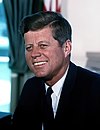The Kennedy family is an American political family that has long been prominent in American politics, public service, entertainment, and business. In 1884, 35 years after the family's arrival from County Wexford, Ireland, Patrick Joseph "P. J." Kennedy became the first Kennedy elected to public office, serving in the Massachusetts state legislature until 1895. At least one Kennedy family member served in federal elective office from 1947, when P. J. Kennedy's grandson John F. Kennedy became a member of Congress from Massachusetts, until 2011, when Patrick J. Kennedy II retired as a member of the U.S. House of Representatives from Rhode Island.
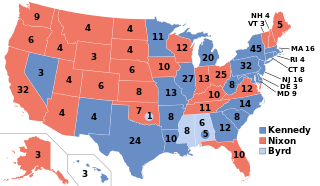
The 1960 United States presidential election was the 44th quadrennial presidential election, held on Tuesday, November 8, 1960. The Democratic ticket of Senator John F. Kennedy and his running mate, Senate Majority Leader Lyndon B. Johnson, narrowly defeated the Republican ticket of incumbent Vice President Richard Nixon and his running mate, U.N. Ambassador Henry Cabot Lodge Jr. This was the first election in which 50 states participated, marking the first participation of Alaska and Hawaii, and the last in which the District of Columbia did not. This made it the only presidential election where the threshold for victory was 269 electoral votes. It was also the first election in which an incumbent president—in this case, Dwight D. Eisenhower—was ineligible to run for a third term because of the term limits established by the 22nd Amendment.

Jacqueline Lee "Jackie" Kennedy Onassis was an American writer, book editor, and socialite who served as the first lady of the United States from 1961 to 1963, as the wife of president John F. Kennedy. A popular first lady, she endeared herself to the American public with her devotion to her family, dedication to the historic preservation of the White House, the campaigns she led to preserve and restore historic landmarks and architecture along with her interest in American history, culture, and arts. During her lifetime, she was regarded as an international icon for her unique fashion choices, and her work as a cultural ambassador of the United States made her very popular globally.

John Fitzgerald Kennedy Jr., often referred to as John-John or JFK Jr., was an American attorney, journalist, socialite, and magazine publisher. He was a son of President John F. Kennedy and First Lady Jacqueline Kennedy.

Edward Moore Kennedy was an American lawyer and politician who served as a United States senator from Massachusetts. A member of the Democratic Party and the prominent Kennedy family, he was the second-most senior member of the Senate when he died. He is ranked fifth in U.S. history for length of continuous service as a senator. Kennedy was the younger brother of President John F. Kennedy and U.S. attorney general and U.S. senator Robert F. Kennedy, and the father of U.S. representative Patrick J. Kennedy.

Ethel Kennedy is an American human rights advocate. She is the widow of U.S. senator Robert F. Kennedy, a sister-in-law of President John F. Kennedy, and the sixth child of George and Ann Skakel. Shortly after her husband's assassination in 1968, Kennedy founded the Robert F. Kennedy Center for Justice and Human Rights, a non-profit charity working to reach his goal of a just and peaceful world. In 2014, she was awarded the Presidential Medal of Freedom by President Barack Obama. She is the oldest living member of the Kennedy family.

Robert Francis Kennedy Jr., also known by his initials RFK Jr., is an American politician, environmental lawyer, anti-vaccine activist, and conspiracy theorist. He is the chairman and founder of Children's Health Defense, an anti-vaccine advocacy group that is a leading proponent of COVID-19 vaccine misinformation. He was an independent candidate in the 2024 United States presidential election. A member of the Kennedy family, he is a son of the U.S. attorney general and senator Robert F. Kennedy, and a nephew of the U.S. president John F. Kennedy and senator Ted Kennedy.
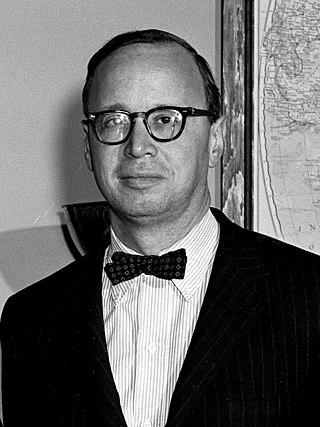
Arthur Meier Schlesinger Jr. was an American historian, social critic, and public intellectual. The son of the influential historian Arthur M. Schlesinger Sr. and a specialist in American history, much of Schlesinger's work explored the history of 20th-century American liberalism. In particular, his work focused on leaders such as Harry S. Truman, Franklin D. Roosevelt, John F. Kennedy, and Robert F. Kennedy. In the 1952 and 1956 presidential campaigns, he was a primary speechwriter and adviser to the Democratic presidential nominee, Adlai Stevenson II. Schlesinger served as special assistant and "court historian" to President Kennedy from 1961 to 1963. He wrote a detailed account of the Kennedy administration, from the 1960 presidential campaign to the president's state funeral, titled A Thousand Days: John F. Kennedy in the White House, which won the 1966 Pulitzer Prize for Biography or Autobiography.

This article outlines the timeline of events before, during, and after the assassination of John F. Kennedy, the 35th president of the United States.

The Kennedy Compound consists of three houses on six acres of waterfront property in Hyannis Port, Massachusetts on Cape Cod. It was once the home of Joseph P. Kennedy Sr., an American businessman, investor, and diplomat; his wife, Rose; and their nine children, including U.S. President and Senator John F. Kennedy and U.S. Senators Robert F. Kennedy and Edward M. Kennedy. As an adult, the youngest son, Edward, lived in his parents' house, and it was his primary residence from 1982 until he died of brain cancer at the compound, in August 2009.
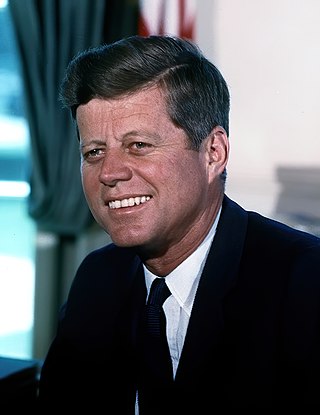
John Fitzgerald Kennedy, often referred to as JFK, was an American politician who served as the 35th president of the United States from 1961 until his assassination in 1963. He was the youngest person elected president. Kennedy served at the height of the Cold War, and the majority of his foreign policy concerned relations with the Soviet Union and Cuba. A Democrat, Kennedy represented Massachusetts in both houses of the United States Congress prior to his presidency.
The Robert F. Kennedy presidential campaign began on March 16, 1968, when Kennedy, a United States Senator from New York, mounted an unlikely challenge to incumbent Democratic United States President Lyndon B. Johnson. Following an upset in the New Hampshire primary, Johnson announced on March 31 that he would not seek re-election. Kennedy still faced two rival candidates for the Democratic Party's presidential nomination: the leading challenger United States Senator Eugene McCarthy and Vice President Hubert Humphrey. Humphrey had entered the race after Johnson's withdrawal, but Kennedy and McCarthy remained the main challengers to the policies of the Johnson administration. During the spring of 1968, Kennedy led a leading campaign in presidential primary elections throughout the United States. Kennedy's campaign was especially active in Indiana, Nebraska, Oregon, South Dakota, California, and Washington, D.C. After declaring victory in the California primary on June 4, 1968, Kennedy was assassinated at the Ambassador Hotel in Los Angeles. He died on June 6, 1968 at Good Samaritan Hospital. Had Kennedy been elected president, he would have been the first brother of a former U.S. president to win the presidency himself.
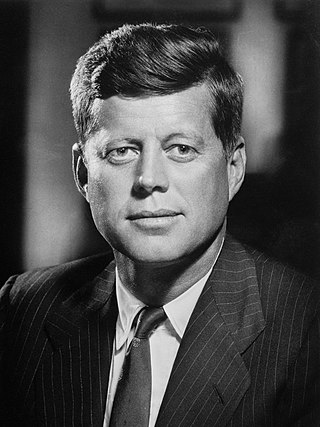
From March 8 to June 7, 1960, voters and members of the Democratic Party elected delegates to the 1960 Democratic National Convention through a series of caucuses, conventions, and primaries, partly for the purpose of nominating a candidate for President of the United States in the 1960 election. The presidential primaries were inconclusive, as several of the leading contenders did not enter them, but U.S. Senator John F. Kennedy of Massachusetts emerged as the strongest candidate and won the nomination over Lyndon B. Johnson at the convention, held from July 11 to 15 at the Los Angeles Memorial Sports Arena.

From March to July 1968, Democratic Party voters elected delegates to the 1968 Democratic National Convention for the purpose of selecting the party's nominee for president in the upcoming election. Delegates, and the nominee they were to support at the convention, were selected through a series of primary elections, caucuses, and state party conventions. This was the last time that state primary elections formed a minority of the selection process, as the McGovern–Fraser Commission, which issued its recommendations in time for the 1972 Democratic Party presidential primaries, would dramatically reform the nomination process to expand the use of popular primaries rather than caucuses.

On June 5, 1968, Robert F. Kennedy was shot by Sirhan Sirhan at the Ambassador Hotel in Los Angeles, California, and pronounced dead the following day.

Sirhan Bishara Sirhan is a Palestinian-Jordanian man who was convicted of assassinating Senator Robert F. Kennedy Sr., a younger brother of American president John F. Kennedy and a candidate for the Democratic nomination in the 1968 United States presidential election. On June 5, 1968, Sirhan shot and mortally wounded Robert Kennedy, who died the next day. The circumstances surrounding the attack, which took place five years after his brother's assassination, have led to numerous conspiracy theories.
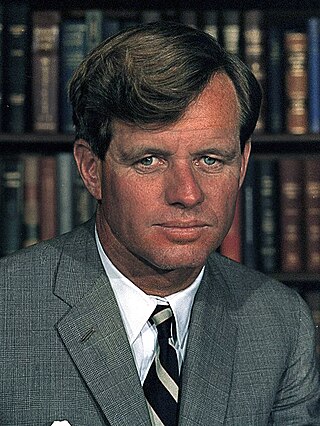
Robert Francis Kennedy, also known by his initials RFK, was an American politician and lawyer. He served as the 64th United States attorney general from January 1961 to September 1964, and as a U.S. senator from New York from January 1965 until his assassination in June 1968, when he was running for the Democratic presidential nomination. Like his brothers John F. Kennedy and Ted Kennedy, he was a prominent member of the Democratic Party and is an icon of modern American liberalism.
Matthew Maxwell Taylor Kennedy is an American lawyer and author. He is the ninth child of Robert F. Kennedy and Ethel Skakel Kennedy.

The Baldwin–Kennedy meeting of May 24, 1963 was an attempt to improve race relations in the United States. Attorney General Robert F. Kennedy invited novelist James Baldwin, along with a large group of cultural leaders, to meet Kennedy in an apartment in New York City. The meeting became antagonistic and the group reached no consensus. The black delegation generally felt that Kennedy did not understand the full extent of racism in the United States. Ultimately the meeting demonstrated the urgency of the racial situation and was a positive turning point in Kennedy's attitude towards the Civil Rights Movement.
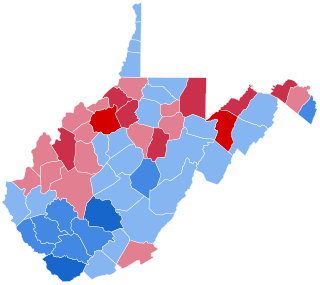
The 1960 United States presidential election in West Virginia took place on November 8, 1960, as part of the 1960 United States presidential election. West Virginia voters chose eight representatives, or electors, to the Electoral College, who voted for president and vice president.



















